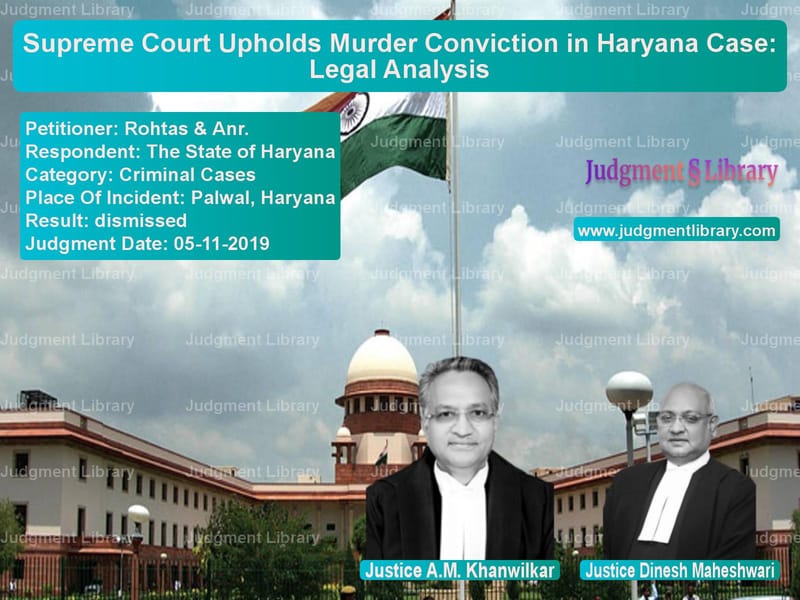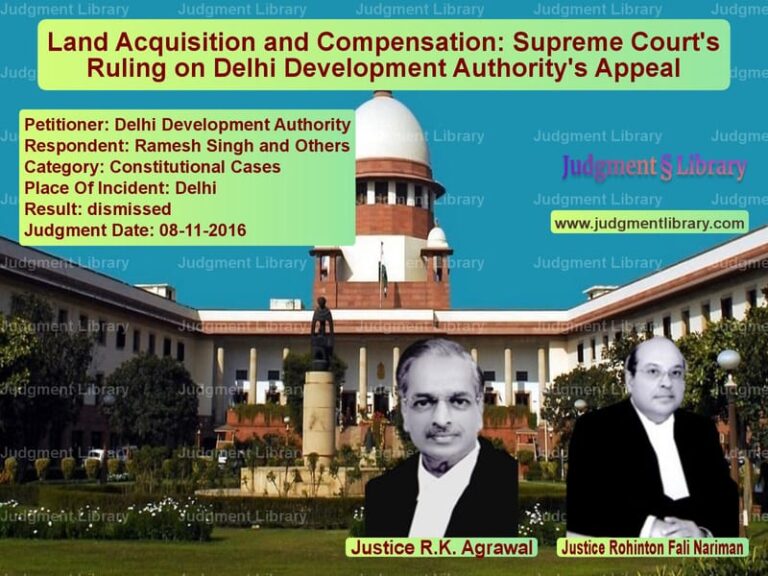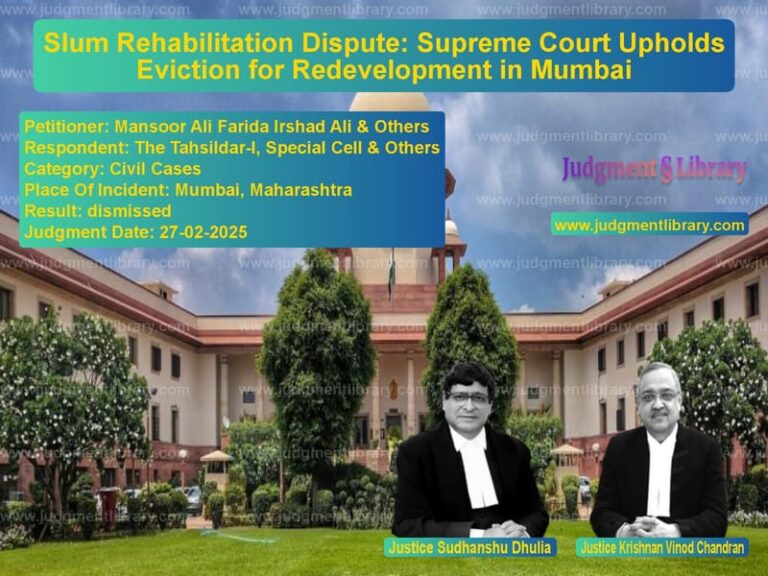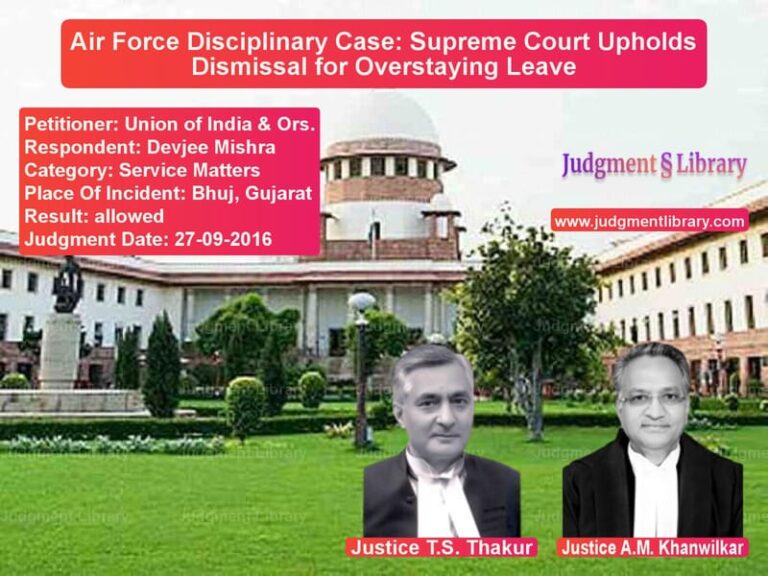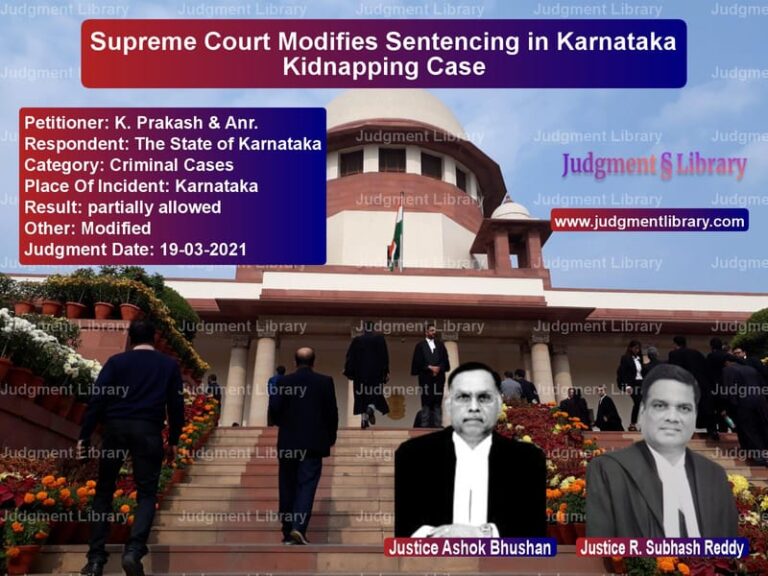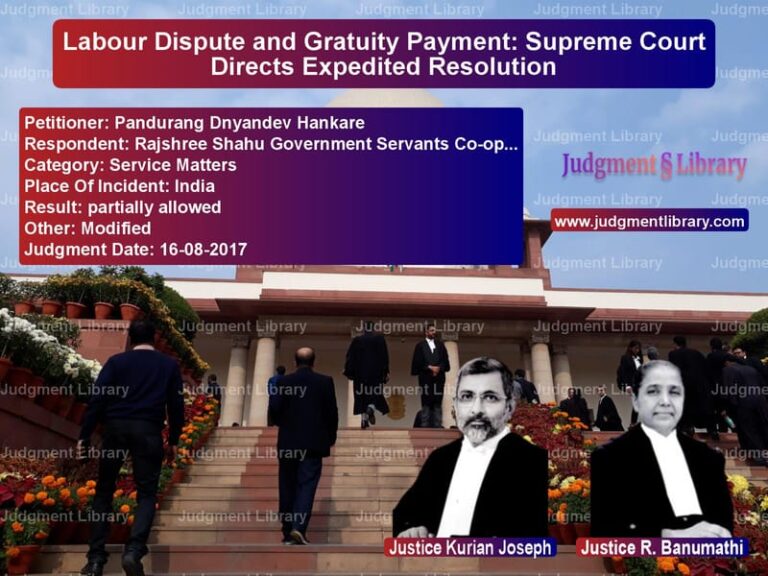Supreme Court Upholds Murder Conviction in Haryana Case: Legal Analysis
On November 5, 2019, the Supreme Court of India delivered a crucial judgment in the case of Rohtas & Anr. vs. The State of Haryana. The case involved a brutal murder in Palwal, Haryana, where the appellants were convicted under Section 302 of the Indian Penal Code (IPC) and sentenced to life imprisonment. The Supreme Court upheld their conviction, rejecting their appeal and reinforcing the principles of criminal jurisprudence regarding witness credibility, evidence evaluation, and procedural fairness.
Background of the Case
The case originated from an incident on April 26, 1998, where Mohar Pal, a resident of Palwal, was allegedly murdered by Rohtas and Surender Singh. The First Information Report (FIR) was lodged on the same night by the deceased’s brother, Bishan Singh (PW-1). The prosecution claimed that the appellants, along with other accused persons, launched a fatal knife attack on the victim while he was leaving a hospital on his motorcycle.
Trial Court Proceedings
The trial commenced in the Sessions Court, where the prosecution presented multiple witnesses, including eyewitnesses Bishan Singh (PW-1) and Baljit Singh (PW-2), medical experts, and police officials. The post-mortem report confirmed that the cause of death was excessive bleeding due to multiple stab wounds.
The defense primarily relied on two arguments:
- The accused were falsely implicated due to prior enmity between the families.
- The prosecution failed to establish a clear motive behind the attack.
Despite these arguments, the Trial Court convicted Rohtas and Surender Singh under Section 302/34 IPC and sentenced them to life imprisonment.
High Court’s Decision
Upon appeal, the Punjab and Haryana High Court re-examined the evidence but found no reason to interfere with the trial court’s judgment. The conviction and sentence were upheld, and the appeal was dismissed. However, two other co-accused, Roop Chand and Dev Kumar, were acquitted due to a lack of direct evidence against them.
Appeal to the Supreme Court
Aggrieved by the High Court’s ruling, the appellants approached the Supreme Court, arguing that:
- The prosecution’s version was unreliable and based on manipulated evidence.
- There were inconsistencies in the witness testimonies.
- The courts ignored crucial lapses in the investigation.
Supreme Court’s Observations
The Supreme Court analyzed the evidence on record and reaffirmed the importance of assessing eyewitness testimony, forensic findings, and procedural fairness in criminal trials.
1. Credibility of Eyewitnesses
The Court emphasized that minor discrepancies in witness testimonies do not affect the overall credibility of the prosecution’s case:
“When eyewitnesses provide a coherent and consistent account of the incident, their testimony cannot be disregarded merely due to minor inconsistencies.”
The Court noted that both Bishan Singh (PW-1) and Baljit Singh (PW-2) corroborated each other’s statements, confirming that Rohtas and Surender Singh inflicted fatal injuries on the victim.
2. Medical Evidence and Post-Mortem Report
The post-mortem report indicated that the victim sustained multiple deep stab wounds, leading to excessive hemorrhage. The Court held:
“Medical evidence supports the prosecution’s theory that the injuries inflicted were sufficient in the ordinary course of nature to cause death.”
3. Motive as a Factor in Criminal Trials
The defense argued that the prosecution failed to establish a motive behind the attack. The Court clarified:
“While motive is a relevant factor, the absence of motive does not undermine an otherwise proven case based on direct evidence.”
4. Inconsistencies in Investigation
The appellants contended that the investigation was flawed and biased. However, the Court ruled that procedural lapses do not necessarily vitiate a trial:
“Mere defects in investigation cannot be a ground for acquittal unless they create serious doubts about the prosecution’s case.”
Final Judgment
The Supreme Court concluded that the prosecution successfully established the guilt of the accused beyond a reasonable doubt. The Court ruled:
- The appeal was dismissed.
- The conviction under Section 302 IPC was upheld.
- The accused were directed to surrender within four weeks.
Legal Implications of the Judgment
The judgment reinforces key principles in criminal law:
- Strengthening Eyewitness Testimony: The ruling clarifies that minor inconsistencies in witness statements do not invalidate their testimony.
- Weight of Medical Evidence: The judgment affirms that forensic and medical findings play a crucial role in corroborating direct evidence.
- Judicial Review of Investigation: The Court reiterated that minor defects in investigation do not automatically lead to acquittal unless they significantly affect the case.
Conclusion
The Supreme Court’s decision in Rohtas & Anr. vs. The State of Haryana upholds the conviction of the accused based on strong direct evidence, reaffirming the legal principles governing murder trials in India. The ruling ensures that procedural lapses do not override substantive justice while highlighting the judiciary’s role in carefully reviewing criminal appeals.
Petitioner Name: Rohtas & Anr..Respondent Name: The State of Haryana.Judgment By: Justice A.M. Khanwilkar, Justice Dinesh Maheshwari.Place Of Incident: Palwal, Haryana.Judgment Date: 05-11-2019.
Don’t miss out on the full details! Download the complete judgment in PDF format below and gain valuable insights instantly!
Download Judgment: Rohtas & Anr. vs The State of Haryana Supreme Court of India Judgment Dated 05-11-2019.pdf
Direct Downlaod Judgment: Direct downlaod this Judgment
See all petitions in Murder Cases
See all petitions in Bail and Anticipatory Bail
See all petitions in Judgment by A M Khanwilkar
See all petitions in Judgment by Dinesh Maheshwari
See all petitions in dismissed
See all petitions in supreme court of India judgments November 2019
See all petitions in 2019 judgments
See all posts in Criminal Cases Category
See all allowed petitions in Criminal Cases Category
See all Dismissed petitions in Criminal Cases Category
See all partially allowed petitions in Criminal Cases Category

